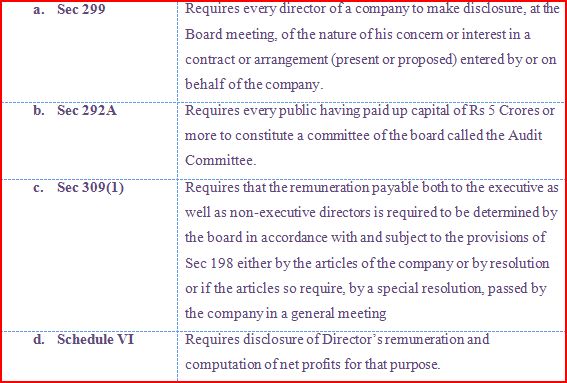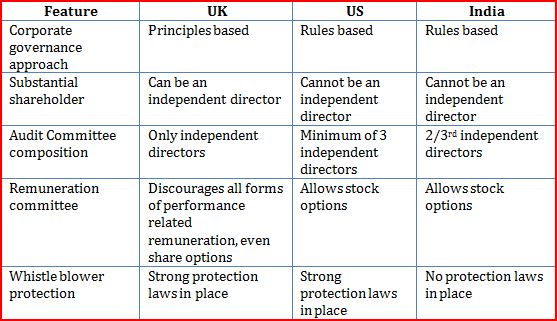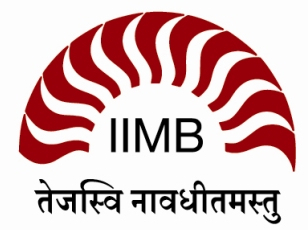Corporate Governance & Independent Directors in India
Faculty Contributor : Anil B Suraj, Visiting Faculty
Student Contributors : Sathish Elango, Shivani Pal, Subash Mundel, Suganth Bhavan and Vidhya D
Recent high-profile corporate governance failures scams like the Harshad Mehta stock market scam, Ketan Parikh scam, UTI scam and of late the mammoth Satyam scam, have received severe criticism from several stakeholders. This called for the need to establish an improved and more transparent corporate governance system as the issue affects the financial and economic development of the country.
The scope of the study is to understand the existing legal frameworks applicable to the Indian Corporate Governance laws, study the changes and amendments in the Corporate Governance laws and analyze the more controversial role of independent directors in the Board. We also intend to make a comparative analysis of corporate governance systems across the US, UK and India to gain insights about drawbacks in our system and to propose our recommendations accordingly.
Corporate Governance in India - Evolution and Challenges
Introduction
The subject of corporate governance leapt to global business limelight from relative obscurity after a string of collapses of high profile companies like Enron, WorldCom, Parmalat in Italy, Satyam in India, the multinational newspaper group Hollinger Inc., New York Stock Exchange etc...
The main provisions dealing with Corporate Governance in the Indian Companies Act are given in the table below:-
 Exhibit 1 Provisions in the Indian Companies Act dealing with of Corporate Governance
Exhibit 1 Provisions in the Indian Companies Act dealing with of Corporate Governance
Pending Amendments
Arguably one of the most important bills that are pending which could potentially alter the corporate landscape of the country is the Companies Bill 2009, which was tabled in the backdrop of the Satyam fraud. While the bill covers the complete umbrella of sections, which encompasses all the components related to the functioning of companies, the most important ones related to corporate governance and independent directors which require special mention are as follows:.
- The bill proposes to introduce “class action suits”, the first of its kind in India, where the company could be sued for “oppression and mismanagement” by the investors.
- It seeks to provide greater authority to the audit committee by giving it statutory powers. Recognition of both accounting and auditing standards.
- The bill also seeks to prohibit insider trading by company directors/key management personnel by treating it is an offence with criminal liability.
Independent Directors - Overview of Corporate Governance Requirements in India
Roles, requirements and independence of directors
Although there have been a number of reforms related to corporate governance, perhaps the single most important for the growth of independent directors was the promulgation of Clause 49 of the Stock Exchange Listing Agreement in 2000 by SEBI.
Definition of independence
Clause 49 Article I (A) (iii) sets out the criteria for the “independence” of independent directors. The clauses added to test the independence of directors in the revised Clause 49 are as follows:
- apart from receiving director’s remuneration, does not have any material pecuniary relationships or transactions with the company, its promoters, its senior management or its holding company, its subsidiaries and associated companies;
- is not a substantial shareholder of the company, i.e. owning two percent or more of the block of voting shares.
Duties of independent director
The academic literature suggests two major roles for the independent directors, which are:
- Independent directors may be seen as watchful monitors of promoters and management on behalf of the public shareholders, or
- Independent directors, given their expertise, may be viewed as reservoir of strategic advice intended to aid promoters and managers in maximizing overall firm value.
Director's Liabilities
Violation of the clause 49 could result in the de-listing of the company. Also, violations of the listing agreements could generate both financial penalties imposed by government and criminal sanctions for directors under the Securities Contract (Regulation) Act 1956.Few of the other provisions, some targeted at directors and some general under which directors may be prosecuted, and are incorporated under The Securities and Exchange Board of India (Prohibition of Fraudulent and Unfair Trade Practices Relating to Securities Market) Regulations, 2003.
Efficacy of the Present Legal Framework on Corporate Governance
In this section we have tried to bring out a set of quantitative parameters (using La Porta framework which focuses on disclosure and liability requirements as well as the quality of public enforcement of the regulations controlling securities markets ) to measure the efficacy of the legal framework on corporate governance in India.
UK and US Policy on Corporate Governance
UK Corporate Policy
Overview of UK Corporate Governance Norms
The UK Corporate Governance Code 2010 is overseen by the Financial Reporting Council (FRC). The Listing Rules 2000 require that public listed companies disclose how they have complied with the code, and explain where they have not applied the code - in what the code refers to as 'comply or explain' . However there is no requirement for disclosure of compliance in private company accounts.
U.S Corporate Policy
Main Principles of the US Sarbanes-Oxley Act
-
Principle I: Ensuring the Basis for an Effective Corporate Governance
-
Principle II: The Rights of Shareholders and Key Ownership Function
-
Principle III: The Equitable Treatment of Shareholders
-
Principle IV: Disclosure and Transparency
-
Principle V: The Responsibilities of the Board
These practices have been greatly stimulated by stricter listing requirements on both the New York Stock Exchange (NYSE) and NASDAQ.
India, US and UK Corporate Governance Norms - A Comparative Approach
A comparative analysis was done between the US, UK and India to gain insights into the Corporate governance system in these countries.
 Exhibit 2 Snapshot of Corporate Governance Regime in UK, US and India
Exhibit 2 Snapshot of Corporate Governance Regime in UK, US and India
-
A substantial shareholder still retains his independence status according to the UK combined code, whereas India and the US exclude substantial shareholders from becoming independent directors.
-
The Audit committee comprises of only Independent directors in case of UK, while India and the US have a more relaxed composition of 2/3rd and a minimum of 3 independent directors respectively.
-
Supportive whistle-blowers protection laws are in place in both the US and the UK, whereas India doesn’t have a law for the same.
Independent Directors and Vicarious Liability
The Companies Act, 1956 looks at all directors alike. It does not exempt independent directors from any of the duties, liabilities, and responsibilities of the Board. As of the current legal norms, Independent directors face the same liabilities as the executive directors. Section 141 of this Act imposes a vicarious liability on the directors of a company who are prosecuted in respect of dishonor of cheque.
The law does not make a distinction between directors who are in charge of the day-to-day affairs of the company and non-executive members attending only the board meetings once in three months. It however does look unreasonable to make such non-executive directors liable for the actions and decisions of the company they may not be aware of.
Limitations: Need for Stricter Legal Norms
In all practicality, one is invited to join a board to act as a nonexecutive director only if he/she is well known to the Promoters or the Chairman or the Managing Director. All non-executive directors, whether or not independent, need support of Promoter Group for their reelection. Consequently, the boards of directors have largely functioned as rubber stamps of the management.
Recommendations
-
Better Defined Rules
The Chair of the Board should be an Independent Director with the roles segregated from that of the CEO
-
Guidelines for legal liability of Independent Directors
As long as the Independent directors show due diligence, the law should exempt them from all types of liabilities for the actions of the board or the managing director they may not be aware of.
-
Improved transparency
Remuneration of CEOs should be decided by a regulatory body like SEBI based on size of the company or decided by institutional investors holding significant stake in the company.
-
Remove One-Size-fits-all approach
Clause 49, which lays down role of the audit committee and role of board disclosure risk management, mentions compliance norms to be independent of the size of the company. This may not necessary yield the desired levels of compliance in India.
-
Better effectiveness
Medium term lock-in options (medium term stock options which are convertible only after 4-5 years or simply through contracts for the number of years of stay) for the CEO to prevent the CEO from acting in ways to gain short term gains from unethical governance.
-
Training Program for new Directors
In order to have a better clarity on the issues facing the business and the upcoming challenges in the industry, many companies could do more in terms of a formal and tailored induction program(which is a recommendation of the Narayana Murthy Report) for their new directors.
Keywords
Corporate Governance, Independent Directors, Audit Committee,Companies Act.
Contributors
Anil B Suraj is a visiting faculty in the Public Policy Area at IIM Bangalore. He holds a PhD from National Law School of India University, Bangalore, India. He can be reached at
absuraj@iimb.ernet.in.
Sathish Elango (PGP 2010-12) holds a Bachelor’s degree in Electrical & Electronics Engineering from PSG College of Technology, Tamil Nadu and can be reached at
sathish.elango10@iimb.ernet.in.
Shivani Pal (PGP 2010-12) holds a bachelor's degree in Electrical Engineering from IIT Kharagpur, West Bengal and can be reached at
shvnpal@gmail.com
Subash Mundel (PGP 2010-12) holds a bachelor's degree in Information Technology from SSN College of Engineering, Tamil Nadu and can be reached at
Subash.mundel10@iimb.ernet.in
Vidhya D (PGP 2010-12) holds a Bachelor’s degree in Geo-informatics Engineering from College of Engineering Guindy, Anna University and can be reached at
vidhya.d10@iimb.ernet.in
References
-
Companies Act 1956, “Corporate Governance Norms”,
http://www.mca.gov.in/Ministry/actsbills/pdf/Companies_Act_1956_Part_1.pdf
-
Standing Report Committee, “Companies Bill 2009”, Presented to Lok Sabha on 31st August 2010.
-
Gordon,J N, “The Rise of Independent Directors in the United States, 1950-2005: Of Shareholder Value and Stock Market Prices”, 59, Stanford Law Review, 1465, 2007.
-
La Porta,Rafael;Lopez-de-Silanes,Florencio and Shleifer,Andrei,"What Works in Securities Laws?", Journal of Finance, 61, pp 1-32, 2006.
-
Law Gazette, “Independent Directors - Who are They and Why Have Them?”, April 2004,
http://www.lawgazette.com.sg/2004-4/April04-feature3.htm
